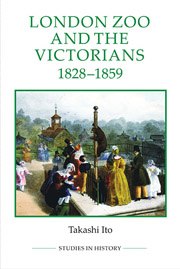Book contents
- Frontmatter
- Contents
- List of figures
- List of tables
- Acknowledgements
- Abbreviations
- Dedication
- Introduction: the zoo in history
- 1 The site of animal spectacle
- 2 Collecting and displaying
- 3 The question of access
- 4 Between science and commerce
- 5 Illusionary empire
- Conclusion: the Darwinian moment
- Appendix
- Bibliography
- Index
3 - The question of access
Published online by Cambridge University Press: 05 April 2014
- Frontmatter
- Contents
- List of figures
- List of tables
- Acknowledgements
- Abbreviations
- Dedication
- Introduction: the zoo in history
- 1 The site of animal spectacle
- 2 Collecting and displaying
- 3 The question of access
- 4 Between science and commerce
- 5 Illusionary empire
- Conclusion: the Darwinian moment
- Appendix
- Bibliography
- Index
Summary
‘The characteristic of the English populace – perhaps we ought to say people, for it extends to the middle classes – is their propensity to mischief. The people of most other countries may safely be admitted into parks, gardens, and public buildings, and galleries of pictures and statues; but in England it is necessary to exclude them, as much as possible, from all such places … This disgraceful part of the English character … can neither be soon nor easily corrected; but anything tends to correct it that contributes to give the people a taste for intellectual pleasures.’
In principle, the London Zoo was open only to Fellows of the Zoological Society, their families and friends. This policy remained unchanged during the first two decades of the zoo's history. In practice, however, the zoo was accessible even to those who were not acquainted with Fellows. The society carefully regulated its complex admission system, but the illegal entry of those described by the society as ‘improper characters’ was common. There was also a continuing tension between the society's attempts to expel strangers and the growing demand for open access to the zoo. As a result, the question of access arose not only with regard to the London Zoo, but also other public institutions involved in the arts and sciences.
- Type
- Chapter
- Information
- London Zoo and the Victorians, 1828-1859 , pp. 81 - 106Publisher: Boydell & BrewerPrint publication year: 2014



